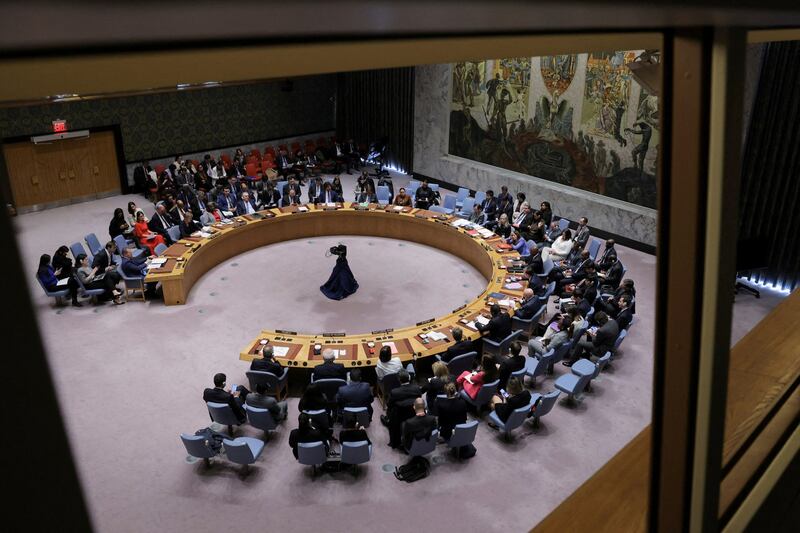Russia faced widespread criticism following its use of veto power to effectively terminate official United Nations monitoring of sanctions on North Korea amid investigations into alleged arms transfers between Moscow and Pyongyang.
The Russian veto at the U.N. Security Council on Thursday blocked the renewal of the panel of experts tasked with probing violations of sanctions related to North Korea’s prohibited nuclear and ballistic missile programs, which was imposed nearly 20 years ago.
For a resolution of the renewal to pass, it must receive the support of at least nine of the 15 members of the Security Council, with no veto from any of the five permanent members – the United States, China, Russia, the United Kingdom and France.
China abstained from Thursday’s vote, while the remaining 13 U.N. Security Council members voted in favor.
The panel, which consists of eight experts drawn from the permanent members of the Security Council, is tasked with assisting the North Korea Sanctions Committee to investigate alleged violations of sanctions by North Korea, and has issued in-depth reports twice a year on the sanctions violations.
The Security Council has extended the panel’s mandate for one year each March by passing a resolution. Its mandate expires at the end of April.

Russia’s Foreign Ministry spokesperson Maria Zakharova said on Friday that its veto was in line with its interests.
“It is clear to us that the U.N. Security Council can no longer use old templates in relation to the problems of the Korean Peninsula,” said Zakharova.
The move follows accusations from the U.S., South Korea and others that Pyongyang is supplying Moscow with weapons to use in its war in Ukraine – a claim that both countries have denied.
But the panel’s report, released in March, detailed, with photographs, Russia’s arms dealings with North Korea in violation of sanctions. It also added that the panel was investigating reports of the arms transfers.
The Russian move met with international criticism with South Korea’s foreign ministry on Friday slamming the move as an “irresponsible decision.”
Ukraine’s Foreign Minister Dmytro Kuleba, writing on social media after the veto, described the move as “a guilty plea,” while Yoshimasa Hayashi, Chief Cabinet Secretary of Japan, said the move was “regrettable” since it “disrespected” the U.N.
Meanwhile, the U.S. State Department spokesman Matthew Miller said Russia’s actions have “cynically undermined” international peace and security.
Russian, Chinese agenda
During negotiations on the draft text on Thursday, Russia and China unsuccessfully pushed for it to include a requirement that the sanctions regime be renewed annually. Over the past few years, both nations have advocated for a relaxation of these sanctions.
Russia’s U.N. ambassador, Vassily Nebenzia, told the council before the vote that Western countries were trying to “strangle” North Korea and that sanctions were losing their “relevance” and becoming “detached from reality” in preventing the proliferation of nuclear weapons in the country.
He accused the panel of experts of “increasingly being reduced to playing into the hands of Western approaches, reprinting biased information and analyzing newspaper headlines and poor quality photos”. Therefore, he said, it was “essentially conceding its inability to come up with sober assessments of the status of the sanctions regime”.
Anthony Ruggiero, the White House NSC Director for North Korea, said that Russia and China were worried the panel would continue to expose the truth: Beijing and Moscow are violating U.N sanctions on North Korea.
Bruce Bennett, senior fellow at an American think tank RAND Institute, shares a similar view.
“After all, Russia and China are regularly violating the U.N. Security Council sanctions against North Korea,” said Bennett.
“Russia in particular is doing this because of its needs for military equipment in its conflict with Ukraine. As long as the U.N. panel of experts is operating, the panel will report on such violations, and Russia does not like being embarrassed by that reporting.
“So if the U.N. panel of experts is no longer watching Russian and Chinese violations, those violations will likely increase and become more serious.”
He notes that the alternative for the U.S. and its allies is forming a new panel to take over from the U.N. experts, focusing on reporting violations of sanctions by Russia and China.
“Such a panel will not have the international clout and prestige of a U.N. panel. Still, hopefully the United States decides to take such actions.”
Edited by Mike Firn and Elaine Chan.
